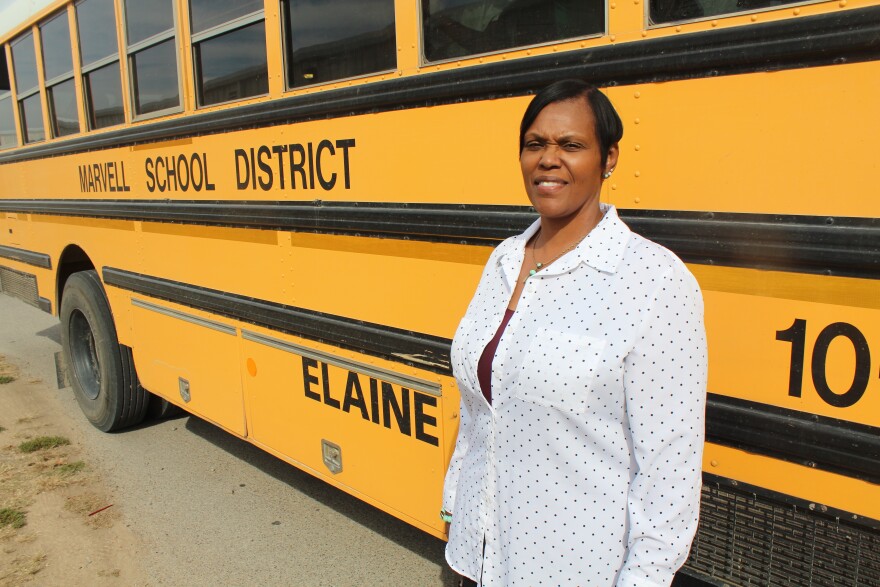Marvell-Elaine schools bus driver Larry Greer’s route twists through the Arkansas Delta, between the White and Mississippi Rivers. “All together I go from Elaine to Snow Lake, 65 miles round trip,” he said, while elementary school kids filed onto his bus for the afternoon ride home.
These are country bus stops along country roads. The way is long. In the morning, Greer says, he will wait only so long at an empty stop before he snaps his levered doors closed again. “If they don’t come out, they’re not going that day.”
Until recently, Marvell Elaine Elementary School kids had one of the highest chronic absentee rates in the state. Eighteen percent of students missed nearly a month of school each year on average, and it's not the high school kids who miss most. The highest rates of absenteeism were recorded by the lowest grades.
But Marvell-Elaine has turned this around and now just 7 percent are chronically absent.
The non-profit Arkansas Campaign for Grade-Level Reading has been working with the school for several years to document and address chronic absenteeism as part of a pilot program that involves several other schools around the state.
Arkansas Advocates for Children and Families recently published a study showing kindergartners who are frequently absent are far less likely to be at reading level by third grade, a pivotal factor for success in subsequent grades.

Statewide about 12 percent of Arkansas students are chronically absent.
The study finds poverty — or students who avail themselves of free and reduced lunch programs, for the purposes of the study — is the biggest correlating factor among students who miss a lot of school.
In one particular survey taken two years ago of third graders in the state, black students and students with special needs were the most likely to be chronically absent, while Latino students were the least (white students fell in between). Of Marvell-Elaine’s 207 elementary students, 80 percent are black, and 98 percent are low income.
Kindergarten teacher Lakyisha Pope has had trouble with students missing in years past. Last year, only one of her students had perfect attendance.
“To able to read, to be able to listen, to be able to comprehend what they read, to be able to comprehend what they hear. If they can’t do that, they’re going to struggle for years to come,” she said.
Pope says attendance rates vary greatly depending on the group of parents she’s working with, and school Principal Sylvia Moore agrees.
“They want to take them shopping or wherever they want to go. They tend to just think, ‘They’re smart, they’re making A’s and B’s, so one day won’t hurt them.'"
Moore says while some of her parents are unable to bring their kids, others simply don't value attendance.
So she's tried implementing some simple, friendly solutions. Her tactics mostly come down to building connections with kids. She greets students in the halls each morning and lets them know she’s glad they’re in school.
A DAY AT THE DENTIST'S
One big challenge in a rural area is access to medical offices. The nearest children’s hospitals are two hours away in Little Rock and Memphis. At one point Moore realized kids were missing nearly a full day to go to the dentist's office in a different town.

The dentist was picking them up as a group to drive 30-miles away, treating them one by one, and returning them as a group in the afternoon. So when a new dentist opened up in Marvell, Moore helped arrange for similar transportation — now kids could get the ride and return to school within a reasonable time.
School social worker Lachandra Johnson makes house calls to parents every time students miss. “I always try to conversate with them. I see them in the stores, I talk to everybody. Probably most of the parents have got my cell phone number, where they call and check, whatever the situation is.”
She offers rides on the weekend, talks about life problems that arise, and helps parents apply for food stamps if they need them. She says she’ll do anything she can for families, who in turn have come to trust her.
“It ain’t just a parents, just a household situation. If you don’t have food in the kids, they’re not going to come to school and do well. Yeah, anything,” said Johnson.
Marvell-Elaine has cut the number of chronically absent students from nearly one in five to one in 15. Arkansas Advocates hopes schools like Marvell-Elaine can serve as a template for solutions. The group has identified a guide for principals around the state which details how to build relationships, provide mentors, and give incentives to students whose attendance record improves.
Arkansas Public Media is a statewide reporting project funded by the Corporation for Public Broadcasting and public radio stations around Arkansas. 'Like' our Facebook page — Arkansas Public Media.org.
*An earlier version of this story failed to attribute efforts in partnership with the Marvell-Elaine Elementary School to the Arkansas Campaign for Grade-Level Reading.











